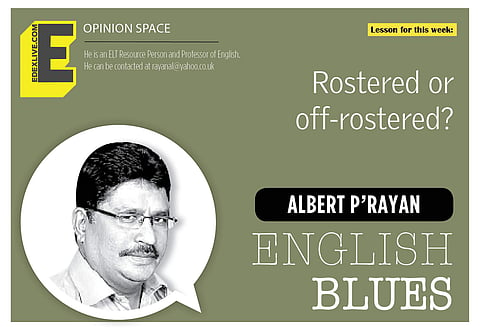

Can the word ‘off roster’ be used as a verb? Recently, a bride and a groom from Madurai got married on board a chartered flight and the ‘mid-air aircraft wedding’ was attended by 130 people who had taken the RT-PCR test and boarded the flight after testing negative. It was reported that the chartered flight flouted some COVID rules.
While one paper headlined the news as: “Mid-air wedding in SpiceJet chartered flight flouts COVID rules; DGCA off rosters crew”, another paper, quoting a senior Directorate General of Civil Aviation (DGCA) official, reported that: “(The airline) crew has been off rostered (taken off duty)”.
Both papers have used ‘off roster’ as a verb in the sentences above. Just like the chartered flight flouted COVID norms, the newspapers have flouted linguistic norms. The term ‘off roster’ is not found in any dictionary. The word ‘roster’ can be used as a noun and as a verb. ‘Roster’, as a noun, means a list of people who work for a particular organisation or who have been assigned particular jobs. As a verb, the word means to place on a roster. Here are some examples:
The cricket team has a roster of 22 players. (noun)
I am not sure whether you have been rostered. (verb)
The phrase ‘rostered day off’ (RDO) is used both in British and American English. What does it mean?
It means a day off work. RDO is given to an employee when they have worked more hours that they are
meant to. The plural form is ‘rostered days off’.
You can meet my brother next week. He has a
rostered day off on Tuesday.
How many rostered days off did you have last month?
One of my father’s friends visited us today. Is the sentence correct? What does it mean?
The sentence is grammatically and semantically correct. The phrase “one of my father’s friends” means that your father has more than one friend and the reference is to one particular friend. It is clear because ‘father’ is singular and ‘friends’ is plural.
Look at this sentence: “One of my friends’ father invited me to dinner”. The sentence means that you have some or many friends and the father of one of them has invited you to dinner.
Look at this sentence: “One of my fathers’ friends presented me with a gift.” This sentence is grammatically correct but not semantically. Why? The sentence implies that the person has more than one father.
